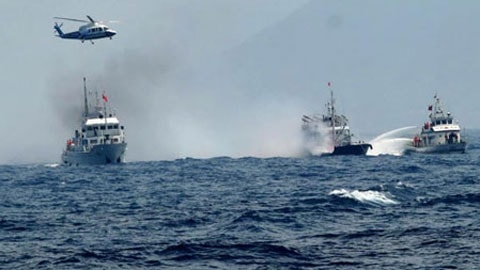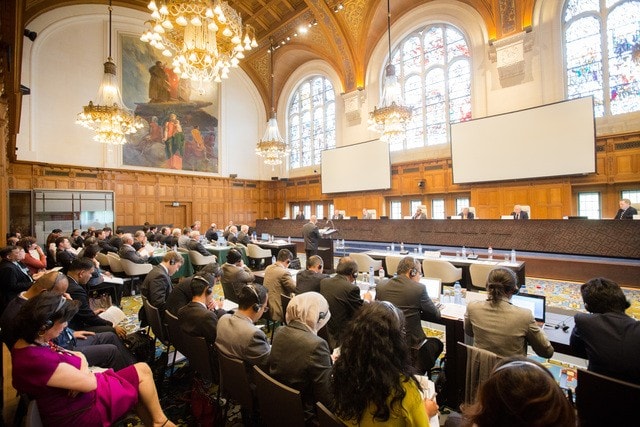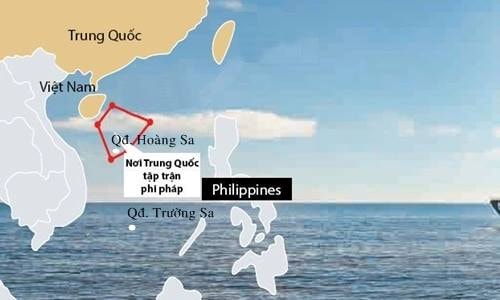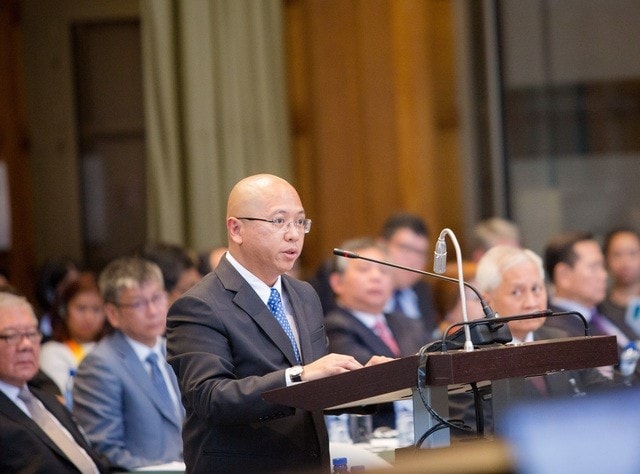Philippines - China before the verdict
(Baonghean) - Tomorrow (July 12) will be the day the Permanent Court of Arbitration in The Hague will issue its verdict on the Philippines' lawsuit against China's "nine-dash line" claim in the East Sea. On the eve of this important political event, Nghe An Newspaper interviewed Associate Professor, Dr., Major General Le Van Cuong - Former Director of the Institute of Strategy and Science of the Ministry of Public Security about this issue.
PV:Major General, can you tell us why the Philippines filed a lawsuit against China and what the content of the lawsuit is?
Major General Le Van Cuong:The Philippines’ lawsuit against China has become the focus of international attention. There are currently more than 50 disputed points on islands and seas in the world, and the parties must resolve the disputes in many ways.
 |
| The East Sea dispute is creating security risks in the region. Photo: Internet |
In the case of disputes with China, the Philippines chose to bring it to the Permanent Court of Arbitration (PCA) in The Hague (Netherlands) because this country has also conducted peaceful dialogue with China on the basis of international law.
However, after many years of failure, former Philippine President Aquino was forced to choose the method of suing China at the PCA - a court established under Annex 7 of the 1982 United Nations Convention on the Law of the Sea. In terms of legal status, the PCA is an international judicial body of the United Nations but does not have the right to decide on sovereignty issues, so in the 4,000-page lawsuit, the Philippines focused on 15 points, but the core was to request the PCA to make a judgment that China's "nine-dash line" claim is contrary to the 1982 United Nations Convention on the Law of the Sea (UNCLOS).
PV:Why did China react to the Philippines' lawsuit and insist on not participating in the lawsuit?
Major General Le Van Cuong:In 2013, as soon as the Philippines submitted its case to the PCA, China publicly announced to the world that the PCA had no legal status, no function, and no authority to accept and resolve this lawsuit, so it would not participate in the proceedings.
China also claims that between them and 10 ASEAN countries, there was a Declaration on the Conduct of Parties in the East Sea (DOC) in 2002. Beijing's view is that this is a solution to the dispute so there is no need for international arbitration. But in fact, what China did not say is that China itself has absolutely no legal basis for determining sovereignty over the two archipelagos of Hoang Sa and Truong Sa, especially for the claim of "nine-dash line" or "cow tongue line".
In 2009, in a diplomatic note sent to the United Nations, for the first time, China announced its view that China has sovereignty over the area occupied by the "cow tongue line" or "nine-dash line". However, this is completely vague because China has not determined the coordinates, and has no basis to make a claim of sovereignty. Because there is no legal basis, they are very afraid of countries suing at the PCA.
PV:So, what does the Major General predict about the PCA's ruling?
Major General Le Van Cuong:Tomorrow (July 12), the PCA will issue its final ruling. The whole world is studying, watching and making many judgments.
The PCA's first ruling on October 29, 2015, 151 pages long, shows that, firstly, based on Annex VII of the 1982 UN Convention on the Law of the Sea, the PCA has full authority to handle and accept the case of the Philippines suing China. Second, China's non-participation in this lawsuit does not affect the PCA's conclusion because both China and the Philippines have joined the Convention on the Law of the Sea and must comply with issues related to dispute settlement. Also in this ruling, the PCA handled 7 out of 15 points raised by the Philippines and will continue to issue a ruling on July 12.
I think from the above ruling, the PCA will have options: First, the PCA will make a ruling according to the Philippines' request that the 100 features in the Spratlys are of only two types. The first type is low-tide elevation rocks, which, according to the 1982 UN Convention on the Law of the Sea, have absolutely no 12-nautical mile territorial waters and no exclusive economic zone. The second type is rocks and islands or inhabited islands, which have a 12-nautical mile territorial waters. Islands also have a 200-nautical mile exclusive economic zone. If the PCA makes a ruling that all features in the Spratlys are only low-tide elevation rocks or rocks, this will be very beneficial for the Philippines in particular and countries with or without disputes in the Spratlys in general because fishing boats, commercial ships, and warships are free to move through the Spratlys' waters without anyone having the right to prevent them.
 |
| From July 7 to 13, the Permanent Court of Arbitration held a closed-door hearing in the Netherlands to hear the Philippines' arguments surrounding the lawsuit. Images inside the court session were only released by the Philippines after the country received an email from the PCA. |
But I think that the PCA must choose to make a ruling that is both favorable to the Philippines, but does not push China to the wall. For example, the ruling that all submerged rocks in the Spratlys do not have legal status to determine the 12-nautical mile territorial sea, and are completely incapable of determining the 200-nautical mile exclusive economic zone, except for some special cases called rocks that have 12 nautical miles.
 |
| China's illegal military exercise area. Graphics: Takungpao |
It is possible that, if the development is positive, the PCA will issue a ruling that the “nine-dash line” claims are unfounded in international law. And it is possible that the PCA will affirm that China’s reclamation activities on submerged rocks in Truong Sa are a violation of the Law on Marine Ecological Environment Protection. We cannot rule out the scenario that the PCA may not mention the above issues but only raise general issues, without favoring any side. One possibility being considered is that the PCA will issue a ruling on 100 features in Truong Sa that only Itu Aba is an island, all other features are rocks or semi-submerged. If so, Itu Aba Island has the right to establish a 200-nautical mile exclusive economic zone, and thus will overlap with all other rock island areas of Vietnam, the Philippines, Malaysia, and Brunei.
Accordingly, even though Itu Aba is occupied by Taiwan, China still has the ability to chase away Vietnamese and Philippine fishing boats fishing in this area. In general, international public opinion predicts that the PCA's ruling on July 12 will likely be favorable to the Philippines and unfavorable to China, both in terms of law and political diplomacy.
PV:How will China react, Major General?
Major General Le Van Cuong:If the PCA rules against China, in my opinion, China will continue to militarize the East Sea, be ready to reclaim Scarborough - the subject of dispute between China and the Philippines in the East Sea and possibly declare the establishment of an air defense identification zone in the East Sea. In addition, China can continue to surround Co May Island, increase the number of coast guard ships to chase away foreign fishing vessels operating in the "nine-dash line". Among the above actions, establishing an air defense identification zone in the East Sea will be the most dangerous because it will touch the great interests of the international community, because if China carries out this action in Truong Sa, it will overlap the entire flight information zone of 10 major cities of Vietnam, Singapore, the Philippines and Malaysia.
PV:World public opinion believes that the new Philippine President Duterte has made many changes in foreign policy towards the US and China. According to the Major General, will these adjustments affect the decision process of this lawsuit?
Major General Le Van Cuong:During the election campaign, in his foreign policy agenda, Mr. Duterte made it clear that he would hold a dialogue with China. And immediately after taking office, this President immediately adjusted his foreign policy. His view is to still cooperate with the US in terms of military and security, but not rely entirely on the US, at the same time Manila opened a door to dialogue with Beijing. China clearly sees that the Philippines needs a large amount of capital to invest in infrastructure such as railway systems, highways, etc.
 |
| Lawyer Florin Hilbay, head of the Philippine Bar Association, argued. China rejects the jurisdiction of the Arbitral Tribunal and refuses to participate. |
And China said it is ready to support the Philippines in building infrastructure, restoring the economy, and even helping the Philippines create new rice varieties so that the country can be self-sufficient in food in the shortest time. So it seems that from June 30 onwards, the relationship between the Philippines and China will develop in a different direction. And this directly affects the dispute and the lawsuit in the East Sea.
But I think that President Duterte will only adjust the relationship within a certain range because he cannot abandon his commitment to the US in the military and security fields, he is following the old path of Mrs. Arroyo before. But whether he wants it or not, the Philippines' own dispute in the East Sea and the solidarity within ASEAN countries in resolving disputes in the East Sea will be affected.
An Nhan
(Perform)
| RELATED NEWS |
|---|
